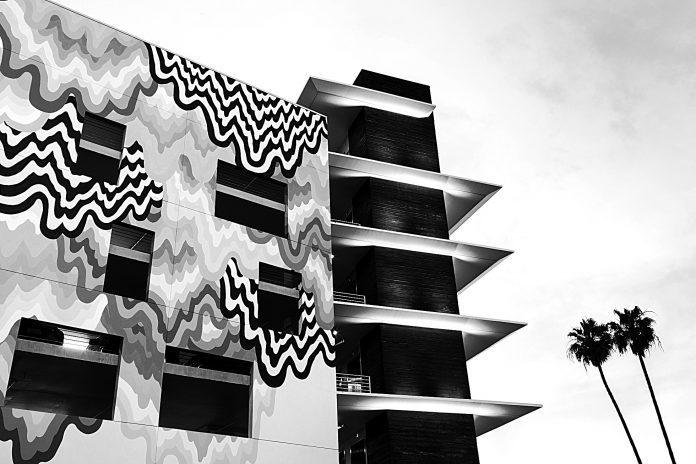By Meredith Powers
Visitors to PLATFORM have likely noticed changes at the mixed-use space on Washington Boulevard – and that’s on purpose.
Frequent changes to the retail and office space, which opened doors in 2016, are intentional.
In proximity to Hayden Tract and the Culver City Arts District, PLATFORM was designed to be a place where emerging artists, designers, and other creative ventures can come to thrive. The development is managed by Runyon Group and was created by founders Joseph Miller and David Fishbein.
Shoppers at PLATFORM can expect a revolving door of new businesses and retail storefronts at the venue that’s constructed to change. Fifteen percent of PLATFORM’s leased spaces, which includes retail, restaurants and workspaces, are designated as short-term leases, according to Chief Operations Officer Erin Mavian.
Mavian, a former New York trend forecaster who joined Runyon Group in 2016, is responsible for identifying merchants and brands that fit the concept. Tenants often highlight certain qualities, like e-commerce or direct-to-consumer brands that have not yet operated a storefront, or innovative companies that are developing elsewhere but are not present in Los Angeles.
Short-term leases operate for a minimum of four weeks and can last up to six months. Some pop-up brands may be invited to lease permanently if indicators like sales and foot traffic show the success.
“We look at overall performance from a sales perspective,” Mavian said. “Obviously we want to extend the offer to brands or businesses that want to stay that have developed relationships with other tenants and community from Culver.”
Whether short-term or permanent, tenants say the venue allows them to develop their brand. Shades of Grey by Micah Cohen operated a pop-up at PLATFORM for three months in 2017 and later opened a permanent storefront.
“Every brand has an aspiration – this is my customer, they’re so cool or they’re this and they’re that – but when you’re in the store, you get to see who your customers really are and what they respond to,” store founder and owner Micah Cohen said. “When you sell to a department store, you don’t know who is actually buying your clothes, why they’re buying it, what they look like. You don’t get that kind of data from them.”
Besides sales performances, tenants are expected to draw in customers through activations – marketing used to generate immediate sales – and in-store events.
“We’ll look at everything from overall performance to how people are responding,” Mavian said. “We ask, ‘Are there things about your business that are going to attract or excite customers that are here, that have already been shopping in your store for the last six months?’”
Other well-known brands like SoulCycle, Blue Bottle Coffee and Aesop are permanent fixtures at the retail tract. With a backdrop of colorful murals, open space seating and urban landscaping, the space is set up differently from traditional shopping malls, which have seen a decline in recent years.
“Typically, in real estate, you build, and then you lease. It’s much more to our advantage to sign a 10-year lease if we can, but we really believe in emerging, independent designers and artists and giving them an opportunity to do something that they hadn’t before,” Mavian said. “They have an audience that’s out there, but it’s rare and difficult to connect in real life and give someone the opportunity to feel like they’re a part of your business or your brand.”
Varley, an activewear clothing line, is currently operating a pop-up at PLATFORM. The brand – traditionally sold through large retailers like Neiman Marcus, Saks Fifth Avenue and Equinox – said the storefront has helped them gain customer feedback they may not get when selling through other stores.
“It’s been a great experience to have face-to-face interactions with our customers,” Varley Marketing Director Cat Kustes said. “We believe that interaction is invaluable as it allows the customer to feel our fabrics and experience the brand on a very personal level, which sometimes can be limiting on social media and email.”
For brands looking to flourish and connect with buyers in person, PLATFORM creates a space where company owners and restauranteurs can, ideally, meet their goals.
“The consumer is someone who is looking for things that are not readily available and not stuff that you’re going to find at a Westfield mall,” Cohen said. “This kind of format is the future of where retail developments are going.”

